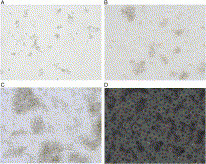"OS & Long-Term Safety of #Nivolumab in Patients With Previously Treated Advanced #NSCLC" JCO http://t.co/TjxJ8tP1Sr
Purpose Programmed death 1 is an immune checkpoint that suppresses antitumor immunity. Nivolumab, a fully human immunoglobulin G4 programmed death 1 immune checkpoint inhibitor antibody, was active and generally well tolerated in patients with advanced solid tumors treated in a phase I trial with expansion cohorts. We report overall survival (OS), response durability, and long-term safety in patients with non–small-cell lung cancer (NSCLC) receiving nivolumab in this trial.
Patients and Methods Patients (N = 129) with heavily pretreated advanced NSCLC received nivolumab 1, 3, or 10 mg/kg intravenously once every 2 weeks in 8-week cycles for up to 96 weeks. Tumor burden was assessed by RECIST (version 1.0) after each cycle.
Results Median OS across doses was 9.9 months; 1-, 2-, and 3-year OS rates were 42%, 24%, and 18%, respectively, across doses and 56%, 42%, and 27%, respectively, at the 3-mg/kg dose (n = 37) chosen for further clinical development. Among 22 patients (17%) with objective responses, estimated median response duration was 17.0 months. An additional six patients (5%) had unconventional immune-pattern responses. Response rates were similar in squamous and nonsquamous NSCLC. Eighteen responding patients discontinued nivolumab for reasons other than progressive disease; nine (50%) of those had responses lasting > 9 months after their last dose. Grade 3 to 4 treatment-related adverse events occurred in 14% of patients. Three treatment-related deaths (2% of patients) occurred, each associated with pneumonitis.
Conclusion Nivolumab monotherapy produced durable responses and encouraging survival rates in patients with heavily pretreated NSCLC. Randomized clinical trials with nivolumab in advanced NSCLC are ongoing.
Via Krishan Maggon



 Your new post is loading...
Your new post is loading...










Published online before printApril 20, 2015, doi:10.1200/JCO.2014.58.3708JCO April 20, 2015JCO.2014.58.3708
Overall Survival and Long-Term Safety of Nivolumab (Anti–Programmed Death 1 Antibody, BMS-936558, ONO-4538) in Patients With Previously Treated Advanced Non–Small-Cell Lung CancerScott N. Gettinger⇑, Leora Horn, Leena Gandhi, David R. Spigel,Scott J. Antonia, Naiyer A. Rizvi, John D. Powderly, Rebecca S. Heist,Richard D. Carvajal, David M. Jackman, Lecia V. Sequist, David C. Smith,Philip Leming, David P. Carbone, Mary C. Pinder-Schenck,Suzanne L. Topalian, F. Stephen Hodi, Jeffrey A. Sosman, Mario Sznol,David F. McDermott, Drew M. Pardoll, Vindira Sankar, Christoph M. Ahlers,Mark Salvati, Jon M. Wigginton, Matthew D. Hellmann, Georgia D. Kollia,Ashok K. Gupta and Julie R. Brahmer
+Author Affiliations
Scott N. Gettinger and Mario Sznol, Yale Cancer Center, New Haven, CT; Leora Horn, David P. Carbone, and Jeffrey A. Sosman, Vanderbilt University Medical Center; David R. Spigel, Sarah Cannon Research Institute/Tennessee Oncology, Nashville, TN; Leena Gandhi, David M. Jackman, and F. Stephen Hodi, Dana-Farber Cancer Institute; Rebecca S. Heist and Lecia V. Sequist, Massachusetts General Hospital Cancer Center; David F. McDermott, Beth Israel Deaconess Medical Center, Boston, MA; Scott J. Antonia and Mary C. Pinder-Schenck, H. Lee Moffitt Cancer Center and Research Institute, Tampa, FL; Naiyer A. Rizvi, Richard D. Carvajal, and Matthew D. Hellmann, Memorial Sloan Kettering Cancer Center, New York, NY; John D. Powderly, Carolina BioOncology Institute, Huntersville, NC; David C. Smith, University of Michigan, Ann Arbor, MI; Philip Leming, Christ Hospital Cancer Center, Cincinnati, OH; Suzanne L. Topalian, Drew M. Pardoll, and Julie R. Brahmer, Sidney Kimmel Comprehensive Cancer Center, Johns Hopkins, Baltimore, MD; and Vindira Sankar, Christoph M. Ahlers, Mark Salvati, Jon M. Wigginton, Georgia D. Kollia, and Ashok K. Gupta, Bristol-Myers Squibb, Princeton, NJ.Corresponding author: Scott N. Gettinger, MD, Yale Cancer Center, 333 Cedar St, FMP127, New Haven, CT 06520; e-mail: scott.gettinger@yale.edu.